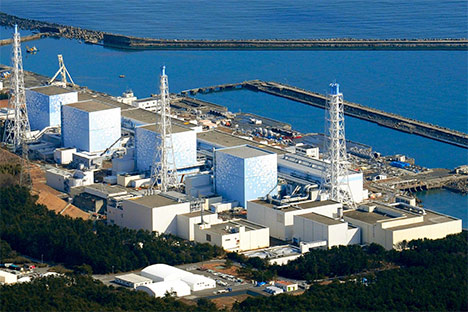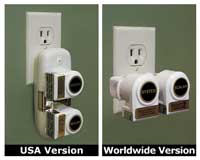|
Fukushima Nuclear Plant May Have Suffered
'Melt-Through'Japan Admits

http://www.emfnews.org
Wednesday 8
June
Molten
nuclear fuel in three reactors at the Fukushima Daiichi
power plant is likely to have burned through pressure
vessels, not just the cores, Japan has said in a report in
which it also acknowledges it was unprepared for an accident
of the severity of Fukushima.
It is the first time Japanese authorities have admitted the
possibility that the fuel suffered "melt-through" – a more
serious scenario than a core meltdown.
The report,
which is to be submitted to the International Atomic Energy
Agency (IAEA), said fuel rods in reactors No 1, 2 and 3 had
probably not only melted, but also breached their inner
containment vessels and accumulated in the outer steel
containment vessels.
The plant's operator, Tokyo Electric Power (Tepco), says it
believes the molten fuel is being cooled by water that has
built up in the bottom of the three reactor buildings.
The report includes an apology to the international
community for the nuclear crisis – the world's worst since
Chernobyl in 1986 – and expresses "remorse that this
accident has raised concerns around the world about the
safety of nuclear power generation".
The prime minister, Naoto Kan, said: "Above all, it is most
important to inform the international community with
thorough transparency in order for us to regain its
confidence in Japan."
The report
comes a day after Japan's nuclear safety agency said the
amount of radiation that leaked from Fukushima Daiichi in
the first week of the accident may have been more than
double that initially estimated by Tepco.
The 750-page
report, compiled by Japan's emergency nuclear task force,
concedes that the country was wrongfooted by the severity of
the accident, which occurred after the plant was struck by
waves more than 14 metres high following the earthquake on
11 March.
"We are taking very seriously the fact that consistent
preparation for severe accidents was insufficient," the
report said. "In light of the lessons learned from the
accident, Japan has recognised that a fundamental revision
of its nuclear safety preparedness and response is
inevitable."
The nuclear
task force's head, Goshi Hosono, said Tepco had failed to
adequately protect plant workers early on in the crisis, and
had provided inadequate information about radiation leaks.
About 7,800
workers had been involved in the battle to stabilise the
plant as of late May, the report said. While their average
exposure dose was well within safe limits, "a certain
number" may have been exposed to more than 250 millisieverts
per year, the maximum allowable dose under revised
government guidelines for Fukushima workers.
The report acknowledged that bureaucratic red tape, and the
division of responsibilities across several government
agencies, had hampered the response to the accident.
It said the government would separate the country's nuclear
safety watchdog from the trade and industry ministry, a
recommendation made earlier this month by a team of experts
from the IAEA.
The trade and
industry minister, Banri Kaieda, said Japan would share all
available data and co-operate with the IAEA. "Our country
bears a serious responsibility to provide data to the
international community with maximum transparency, and to
actively contribute to nuclear safety," he said.
The most
urgent problem facing workers at Fukushima Daiichi is how to
deal with vast quantities of highly radioactive water that
has accumulated in reactor buildings and basements and in
ditches.
The estimated
100,000 tonnes of contaminated liquid – runoff from water
used to douse overheating reactors – is hampering efforts to
repair the plant's cooling systems.
Tepco has said it hopes to have a system in place by the
middle of the month to remove radioactive substances from
the water, enabling it to be reused to cool reactors.
http://www.emfnews.org/stores |








